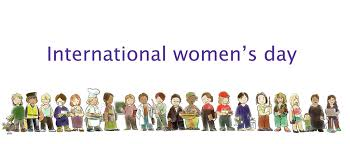Resources for March-April 2015 NewsNotes
Resources on International Women’s Day, World Water Day, Earth Day, the crisis at the border, and more …
1) 20 years after Beijing: Where do women’s rights stand? In September 1995, 17,000 participants and 30,000 activists streamed into Beijing for the opening of the Fourth World Conference on Women. They gathered with a common purpose: gender equality and the empowerment of all women. After two weeks, representatives of 189 governments forged commitments that were historic in scope. By the end, the Conference had produced the Beijing Declaration and Platform for Action, “the most progressive blueprint ever for advancing women’s rights.” As a defining framework for change, the Platform committed to 12 critical areas of concern, and now, 20 years later, remains “a powerful source of guidance and inspiration.” Celebrate Women’s Day on March 8, and learn more at the Beijing+20: Inspiration Then and Now website. Additional resources: (1) The Partnership for Maternal, Newborn and Child Health, World Women’s Health and Development Forum: Post-2015 Desired Outcomes, here, and (2) World Women’s Health and Development Forum, here.
2) World Water Day: Designated by the UN to be celebrated on March 22 every year, World Water Day is a day to make a difference for the members of the global population who suffer from water related issues. It’s a day to prepare for how we manage water in the future. In 2015, the theme for World Water Day is “Water and Sustainable Development.” Learn more and find resources here.
3) “Have you anything here to eat?” Sustainable food in a changing climate: Creation Justice Ministries offers this free downloadable resource to use for reflection on Earth Day Sunday, April 22. The resource invites us to reflect in particular on how climate and food concerns impact us. How does food production and consumption impact the climate? How does climate change affect growing and accessing food? Find it here.
4) On the front lines: Border security, migration, and humanitarian concerns in South Texas: With the recent Congressional debate over a Department of Homeland Security funding bill, the issue of border security is in the spotlight. But while some in Washington quarrel over a nebulous “crisis” at the border, a lesser-known—but in many ways more grim—situation is playing out in Texas’s Rio Grande Valley region. Read more in this new report from the Washington Office on Latin America. Downloadable and printable versions are found here.
5) Trade, violence and migration: The broken promises to Honduran workers: In October 2014, a delegation arrived in Honduras to meet with workers, labor, faith and community partners as well as government officials and learn about the impact of U.S. trade and immigration policies on Honduran workers and their families. The delegation spoke with union leaders representing sectors affected by the Central America Free Trade Agreement-Dominican Republic (CAFTA-DR, or CAFTA) including port workers, and workers from agriculture, manufacturing and apparel industries. They met with returned migrants, who faced dangerous journeys and militarized border enforcement and detention. They heard from local community and political leaders who explained the endemic political corruption in the country, and their struggle for a more just Honduras. Download the report about their visit here.
6) The voice of the voiceless: The role of the church in the Sudanese civil war, 1983-2005: This book, written by John Ashworth, is an informative and readable human interest story, based on the actual experiences of Ashworth and others, and materials gathered from key informants. It attempts to tell the story of church involvement, through the eyes of people who were there, and demonstrates the ecumenical nature of the Church in Sudan. 304 pages. Order from Paulines Africa; search for ISBN 9966-08-836-9; $10 hard copy, $7 e-book.

